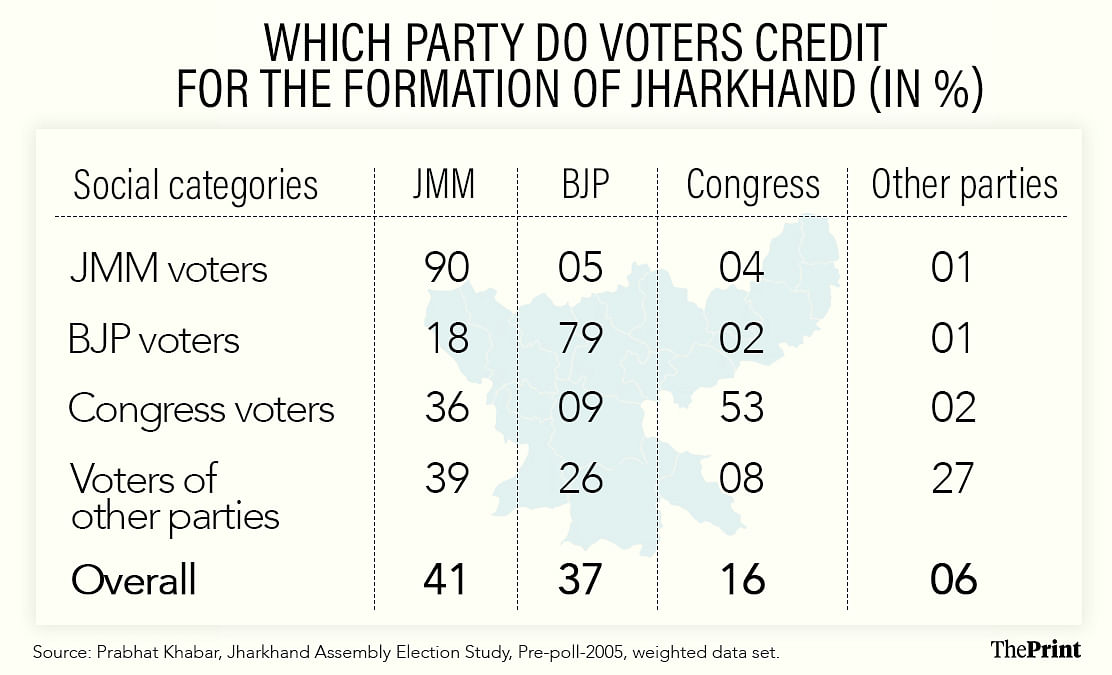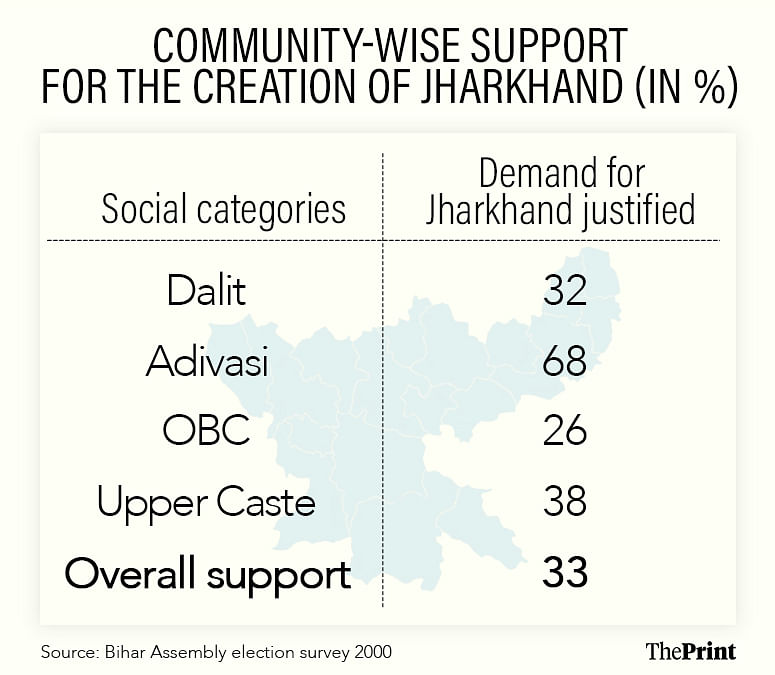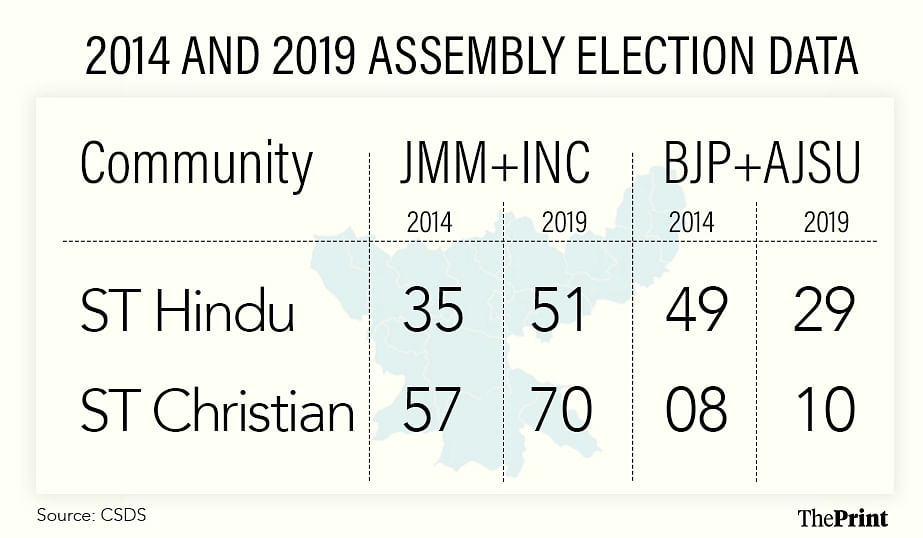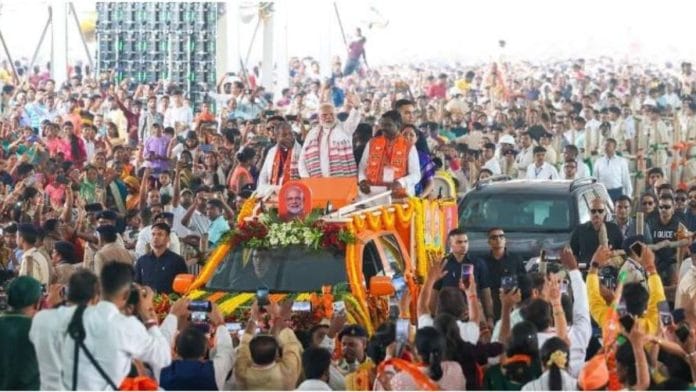The Jharkhand Assembly election will be held in two phases, on 13 and 20 November. While the Jharkhand Mukti Morcha has made the pride of Jharkhand and its citizens a central campaign issue, the Bharatiya Janata Party’s rhetoric focuses on corruption, unemployment, nepotism, and Hindu-Muslim division. The BJP even has a catchy slogan—‘roti, beti, aur mati’—but it still has to overcome the Himalayan hump called tribal-reserved seats. Jharkhand has a tribal population of 27 per cent, with 28 of the 81 assembly seats reserved for tribal candidates.
The JMM’s slogans resonate strongly with the Jharkhandi and Adivasi communities. Tribal leader Hemant Soren, who was released from jail in June on charges of money laundering and alleged involvement in a land scam, was sworn in as Jharkhand’s chief minister for his third term on 4 July. Soren’s release is likely to garner sympathy from the Adivasi community. The JMM, known for its pivotal role in the creation of Jharkhand, is campaigning on Adivasi and Jharkhandi identity to appeal to voters, claiming 41 per cent of the credit for the state’s formation.
Jal, Jangal, Jameen Ka Mile Adhikar, Isliye Dohraenge Abua Sarkar (We will repeat our government to get rights over water, forest, and land).
Abua Aavaaz Ka Aagaaz, Jharkhand Hai Hemant Ke Saath (Our voice begins, Jharkhand is with Hemant).
The JMM received the highest recognition for leading the demand for Jharkhand’s statehood, with 41 per cent of respondents crediting the party for the formation of the separate state. This is 4 per cent higher than the BJP’s support, despite the fact that the BJP-led NDA government was in power at the Center when Jharkhand was established.

With 68 per cent, Adivasis were at the forefront of the movement for the creation of Jharkhand, more than double the average support of all social groups combined.

BJP wants to woo Adivasis
In Jharkhand, the BJP is focusing on demographic changes in Santhal Pargana, alleging an increase in the population of ‘Bangladeshi Muslims’. BJP MP Nishikant Dubey, West Bengal BJP chief Sukanta Majumdar, and Murshidabad BJP MLA Gauri Shankar Ghosh have called for several regions in West Bengal, Bihar, and Jharkhand to be turned into a Union Territory.
Dubey named these areas in Parliament—Malda and Murshidabad in West Bengal; and Araria, Kishanganj, and Katihar in Bihar—which he said should be merged with Jharkhand’s Santhal Pargana region, whose tribal population, according to him, has declined from 36 per cent in 2000 to 26 per cent today.
Ghosh, representing Murshidabad in the West Bengal Assembly, alleges that the area has become a gateway for terrorism from Bangladesh and faces the issues of shifting demographics and inadequate law and order. The BJP seems to be using this issue to create tensions between Adivasis and Muslims, with leaders like Amit Shah, Himanta Biswa Sharma, and Shivraj Singh Chouhan raising this narrative at campaign rallies. They also advocate for implementing the National Register of Citizens (NRC) in the region, aiming to polarise Hindu voters and integrate Adivasi interests into the Hindutva agenda while countering the demand for the Sarna Dharma Code—an indigenous people’s demand for a separate religious identity in the Census.
The JMM is countering the BJP by accusing it of undermining Adivasi identity through the Union Territory proposal, which it says dilutes the struggles of Adivasis and Jharkhandis. Union territories are created for geographical, cultural, and political reasons. BJP is giving a cultural reason by claiming that the Adivasi statehood culture will end through the immigration of Bangladeshi Muslims—because of Muslims marrying Adivasi women.
Also read: Jharkhand converted into ‘dharmashala’ for Rohingyas, Bangladeshi infiltrators: Adityanath
Roti, beti, mati
The controversy involving BJP candidate Sita Soren, sister-in-law of Hemant Soren, and Congress MLA Irfan Ansari has intensified after Ansari made a derogatory remark against Sita Soren. She criticised the statement, claiming that it was disrespectful to both women and the tribal community. The BJP has lodged a complaint with the Election Commission, while the Scheduled Tribe Commission has sought a report from the Jharkhand government regarding the remarks. The BJP has also criticised Hemant Soren for not defending his family member, suggesting it’s due to Muslim vote considerations.
BJP is contesting this Assembly election on the central theme of ‘roti, beti, mati ki pukar, Jharkhand me BJP-NDA ki sarkar. The Soren vs Ansari controversy solidifies the BJP slogan. The party wants to pit Adivasis against Muslims to woo the Adivasi voters. The name Sita also holds significance as a symbol within the Hindutva ideology, which the BJP plans to leverage in its messaging.
Working for the tribal vote
In July 2022, the BJP-led NDA appointed Droupadi Murmu, the first President from the Tribal community, who previously served as the Governor of Jharkhand. The BJP highlighted their support for a tribal leader, while several Opposition leaders supported Yashwant Sinha instead, who belongs to Jharkhand.
After winning the Chhattisgarh Assembly election in December 2023, the BJP appointed Vishnu Deo Sai as the Chief Minister. Chhattisgarh, a tribal-dominated state, shares a border with Jharkhand. In June 2024, the BJP, following its first victory in Odisha, appointed Mohan Charan Majhi, also a Tribal leader, as CM. This move signals to Adivasi voters in Jharkhand that the BJP plans to appoint only Adivasi CMs in tribal-centric states. In March 2018, BJP appointed Samir Oraon as the National President of the party’s ST Morcha chief and sent him to the Rajya Sabha. BJP also accommodated Champai Soren in its fold to attract tribal voters of Kolhan region.
The 150th birth anniversary of freedom fighter and tribal leader Birsa Munda will be celebrated on 15 November. In 2021, the BJP government declared the day as Janjatiya Gaurav Divas to remember the contribution of tribal communities across India. Last year, Prime Minister Narendra Modi celebrated this day by visiting Ulihatu village, Birsa Munda’s birthplace in Jharkhand, making him the first PM to do so. President Murmu also visited Ulihatu on Janjatiya Gaurav Divas, marking the first visit by a President.
Moreover, the BJP keeps crediting itself for creating Jharkhand. About 23 years ago, during former PM Atal Bihari Vajpayee, Jharkhand was carved out of Bihar, recognising its tribal identity. The Vajpayee government also established the Ministry of Tribal Affairs and the National Commission for Scheduled Tribes.
During this period, Arjun Munda, a tribal leader from Jharkhand, was appointed as the state’s first tribal minister. Vajpayee also came up with a dedicated budget for tribal development.
BJP launched the Pradhan Mantri Particularly Vulnerable Tribal Group (PVTG) Development Mission in 2023, or Adivasi Janjati Nyaya Maha Abhiyan (PM JANMAN) to provide justice to tribal communities. The central government is also planning to open more than 700 Eklavya Model Residential Schools (EMRS) across tribal areas in India.
In the 2019 state Assembly elections, the Adivasi community voted for the Hemant Soren-led alliance, seeking a Chief Minister from their community after dissatisfaction with the BJP’s choice of Raghubar Das, a non-tribal leader.
Ahead of the 2024 Lok Sabha elections, the BJP strategically merged with Babulal Marandi’s party Jharkhand Vikas Morcha. Marandi, Jharkhand’s first Chief Minister and an Adivasi leader, had rejoined BJP in 2020. He became the Jharkhand BJP president in 2023. Now, he is the central figure in BJP’s campaign. This highlights BJP’s possible intention to support an Adivasi candidate for the Chief Minister post in upcoming elections.
Voting pattern of Adivasis
The recent efforts made by the BJP to attract the Adivasi vote are noteworthy, especially since the party’s big defeat in the 2019 state assembly elections. It lost Adivasis’ support.

The BJP lost all five ST Lok Sabha reserved seats in Jharkhand for the first time in 2019, as the ruling JMM-led alliance won in Khunti, Singhbhum, Lohardaga, Rajmahal, and Dumka. This setback hinted that the saffron party may struggle in the 2024 Jharkhand Assembly elections in the Adivasi reserved seats.
In Jharkhand, there are a total of 81 assembly seats; 28 are reserved for the ST. The JMM-led alliance in 2019 won 47 seats overall out of which 25 seats are tribal reserved seats. The JMM-led alliance won 90 per cent reserved seats of the tribals. In 2019, the BJP won only two of the reserved seats. One of these seats was won by Marandi’s party. If the trends observed in the Lok Sabha and previous assembly elections continue, it appears that the BJP is unlikely to achieve a majority. It can’t form a government without winning the tribal seats.
Krishna Mohan Lal is a PhD research scholar at Tata Institute of Social Sciences, Mumbai. He tweets @Maitreya_G. Views are personal
(Edited by Ratan Priya)






